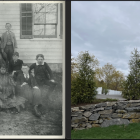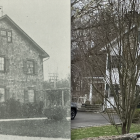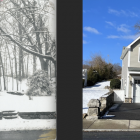Homepage Featured
New Canaan Now & Then: Miss Ayres School
|
‘New Canaan Now & Then’ is sponsored by Brown Harris Stevens Realtors Joanne Santulli, Karen Ceraso, Bettina Hegel and Schuyler Morris. The house at 119 Seminary Street (some list it as 115) was once the New Canaan Institute or “Miss Ayres School,” established in 1873 by Harriet Ayres.
According to a 1938 letter from former student W. Benedict, Miss Ayres School supported 25 to 35 students. She established the school because she found the 19th century public school inadequate to prepare students for college. Miss Ayres’ husband, Edward F. Ayres, died in 1900 and her eldest son, Edward, attended Yale where he won the sophomore prize in mathematics in 1886.
One of her students, Percy Raymond, became a Harvard professor emeritus of paleontology and praised Miss Ayres as “the best teacher I have ever encountered.” An Advertiser article dated May 22, 1952 stated “she worshiped at the altar of culture and was responsible for several New Canaan boys who sought higher education and gave a pretty good accounting of themselves later in life.” In 1899 she retired from teaching after 30 years.
She was the first president of the New Canaan Women’s Club—“thirty five brave progressive souls” who had their first meeting at No. 4 Railroad Avenue—present-day Elm Street—at the Reading Room on Sept.




